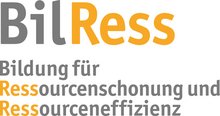BilRess
Identifying and Developing Opportunities for All Areas of Education in the Field of Resource Preservation and Resource Efficiency

Many studies predict a considerable increase of global resource consumption in the next decades. Along value chains, the environmental impact is rising, caused by the extraction of resources, the emissions linked to it and the increasing amount of waste. Furthermore, fluctuating and rising costs for resources can be observed, potentially diminishing the German economy's competitive edge. This tendency might moreover intensify social conflicts. A strategy to increase resource efficiency and employing adequate policy measures is, therefore, required.
One important factor is to foster a consciousness for preserving and efficiently using resources, and to establish a corresponding culture to protect resources. To do so, education plays an important role and educating for resource efficiency and resource preservation (R&R) should be established in all areas of education. Competencies to carefully handle natural resources should be globally developed in the educational systems. Current findings, however, show that at present education for resource efficiency is not yet established in all areas of education in Germany.
The joint project aims at contributing to the goals of resource policy (e.g. the German ProgRess-strategy) through an educational strategy. Decreasing the amount of resources used can only be accomplished through qualifying the respective actors in economy, politics and society.
The following steps aim to foster a consciousness for resource efficiency:
1. Process to develop a "Roadmap Natural Resources Education" in interaction with relevant actors in the educational systems to integrate resource efficiency and preservation in all important educational contexts in the future. The Roadmap serves as an orienting concept and is comprised of an inventory of existing educational opportunities (determination of contents, structures, competencies and actors) (WP 1). Results will be so called BilRess-cards, showing the most important results as mind maps. Building on this, needs for action and approaches to improve Natural Resources Education will be determined employing expert interviews and focus groups (WP 2). Results will be integrated into an orienting concept in an intensive dialogue with stakeholders. The aim is to develop the conceptual paper - based on a discourse with experts - in such a way that a later implementation is most likely successful (WP 3).
2. To accompany this, a network "Education for ProgRess" will be built up. Furthermore, an online communication platform will be set up and several events to communicate the ideas of the project will be conducted (WP 4). To do so, the project can build on existing activities in the field of Education for Sustainable Development and especially on the German "Resource Efficiency Network". The aim is to broadly reach actors to join the network and to achieve in depth communication of the project. The public relations work is comprised of several network meetings; results will be presented at the "Didacta - die Bildungsmesse" fair in 2015. A large conference will be conducted in the same year.
